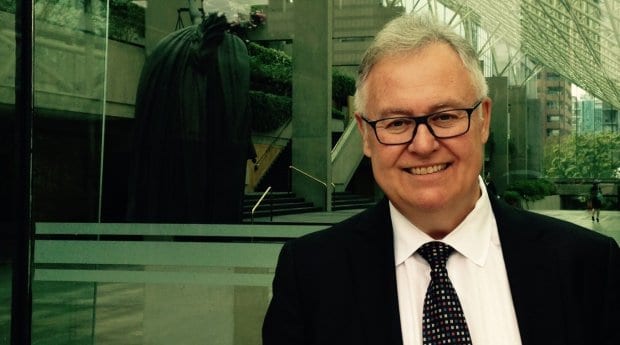Trinity Western University’s (TWU) religious freedom may allow it to discriminate under the Charter of Rights and Freedoms, but the Law Society of BC cannot discriminate, the society’s lawyer told BC Supreme Court Aug 26.
The law society had to consider the discriminatory aspects of the evangelical Christian university’s covenant, Peter Gall argued in the third and final day of hearings. TWU is suing the BC law society for rejecting its future graduates.
“The law society is subject to the Charter,” Gall told Chief Justice Christopher Hinkson. “The fact its decision affects a private institution does not mean its decision is immune from the Charter.”
At the centre of the controversy that has played out in law societies across Canada is TWU’s community covenant, which says students should uphold Christian biblical teachings and refrain from any sex outside traditional, heterosexual marriage.
TWU lawyer Kevin Boonstra asked the court Aug 24 to order the law society to reinstate its original decision to accredit TWU law graduates. In day two of proceedings, he argued that the law society’s job is to regulate professional competence; not morals.
Gall argued that the society’s mandate is wider than that, and must include issues of public interest.
He told the court that TWU’s covenant would limit admissions for LGBT students. Christian students would have access to the full pool of law-school seats in Canada, but LGBT students would not have access to the TWU seats, thus limiting their access to the legal profession, he said.
Gall suggested the law society tried to balance religious freedom with equality rights in reaching its October 2014 decision to rescind its earlier approval.
Gall suggested that a 2001 Supreme Court of Canada decision in a case between TWU and the BC College of Teachers failed to strike a balance between equality rights and religious freedom.
The 2001 ruling upheld TWU’s right to teach Christian values to would-be teachers and to insist that incoming students sign its covenant. The court found the university’s teacher program graduates are entitled to hold “sexist, racist or homophobic beliefs” as long as they didn’t act on them in the public school classrooms to which they might be assigned.
In that case, Gall told Hinkson, the court found religious rights prevailed.
But, Gall argued, ”if the law society doesn’t have the power to consider equality issues, there is no balancing issue. There is no balance.”
Boonstra argued Aug 25 that the law society has no place deciding whether “Trinity Western and the community covenant are contrary to the public interest.” He said the law society decision penalizes prospective law students for associating with those in the same religious community. He urged state neutrality on the issue.
Gall disagreed.
If religious practices are kept private, the state has no place intervening, Gall said. But when the religious practice enters the public realm and impacts others, “the state cannot be indifferent to the basic rights of individuals,” he said.
In issues of equality, human rights and democracy, the state always has a legitimate interest, he argued.
He cited a case where the BC Human Rights Tribunal ruled that a Christian couple violated a gay couple’s rights when they denied the two men accommodation at their Grand Forks bed and breakfast in 2009.
He said the Christian couple had entered the public sphere and could not discriminate.
“That’s what we have here,” Gall said. “We have the law society . . . determining the line has been crossed.”
But, he acknowledged, it’s difficult to draw the line demarcating exactly where religious practice crosses into the public sphere.
Here Hinkson interjected. “Where is the evidence they considered religious freedom at all?” he asked, referring to the law society.
Gall said it was within the law society’s powers to call a membership referendum on the issue. The referendum saw law society members vote three-to-one to rescind approval for the school. The law society directors accepted the membership’s vote and rescinded approval on Oct 31, 2014.
“They had pre-ordained they were going to be bound by it [the referendum],” Hinkson commented.
Hinkson also noted the society had included in the referendum package a commentary from the lawyer who objected to the original school approval and launched a petition calling for a special general meeting to discuss the issue.
“How can I have confidence when [society directors] align themselves?” Hinkson asked.
Gall said the concerns of the LGBT community were not before the membership. But the competing religious and equality arguments in the case were well known, he acknowledged.
“It has to be assumed that every member who voted made their own decision of which should prevail,” Gall said.
Lawyer Janet Winteringham told Hinkson it was incumbent on the law society to consider equality rights.
Winteringham, representing intervener West Coast LEAF, said the covenant also affects the rights of women and couples in common-law relationships.
She said TWU is allowed to have an admissions policy that excludes some people. “The law society cannot be so exclusionary,” she argued. “They must take into account the equal rights of others.”
She said the society had to consider that 60 law school seats would not be available to members of historically disadvantaged groups if TWU were allowed to operate a law school.
Hinkson reserved judgment in the case. It is not known when he might rule.

 Why you can trust Xtra
Why you can trust Xtra


